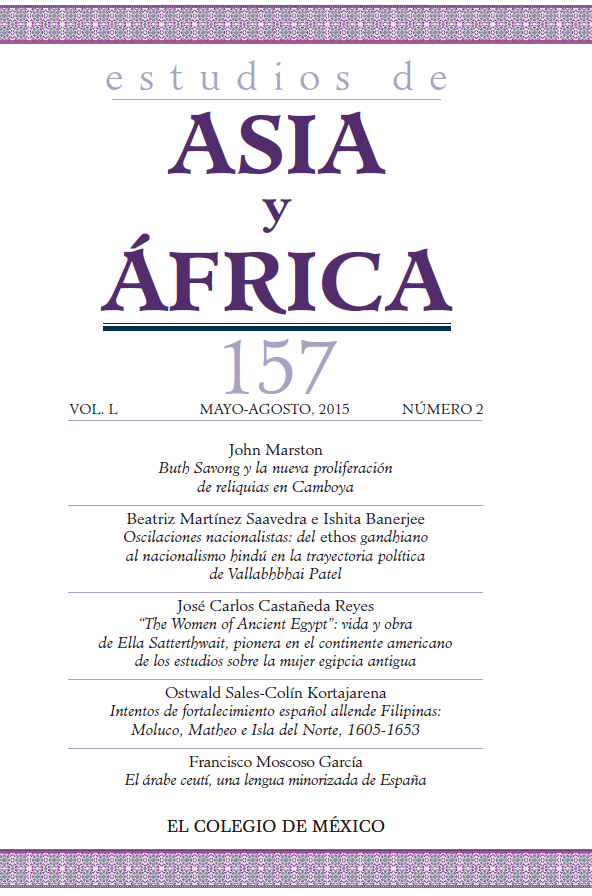Resumen
Este ensayo explora la filosofía y métodos de lucha política de Gandhi a la luz de la percepción y apropiación que hizo de éstos Vallabhbhai Patel, uno de los discípulos clave de Gandhi y un político influyente en la lucha nacionalista por la independencia india. Por medio de un análisis sistemático y matizado de la trayectoria de Vallabhbhai Patel, se muestra cómo las ideas de Gandhi, basadas en un quehacer político regido por la moral y la ética, se prestaron a aplicaciones y aprehensiones distintas y contradictorias. La mezcla de lo religioso y lo político en el pensamiento de Gandhi y su adaptación a la retórica del nacionalismo (cultural) hindú, permitió a Vallabhbhai transitar de un nacionalismo gandhiano a un nacionalismo hindú hostil hacia los grupos minoritarios. La carrera de Vallabhbhai subraya la estrecha interrelación que existe entre un nacionalismo anticolonial y un nacionalismo hindú militante, los cuales coexistieron en las mismas coordenadas espacio-temporales e impulsaron una cultura de polarización social, la cual sigue nutriendo las formas de movilización política.
Referencias
Alavi, Hamza, “Ironies of History: Contradictions of the Khilafat Movement”, en Mushirul Hasan (ed.), Islam, Communities and the Nation: Muslim Identities in South Asia and Beyond, Nueva Delhi, Manohar, 1998, pp. 25-56.
Amin, Shahid, “Gandhi como Mahatma: Distrito de Gorakhpur, UP Oriental, 1921-1922”, en Saurabh Dube (coord.), Pasados posco¬loniales. Colección de ensayos sobre la nueva historia y etnografía de la India, México, El Colegio de México, 1999, pp. 345-401.
Chaterjee, Partha, “Gandhi and the Critique of Civil Society”, en Ranajit Guha (ed.), Subaltern Studies iii: Writings on South Asian History and Society, Nueva Delhi, Oxford University Press, 1984, pp. 153-195.
Cohen, Anthony P., The Symbolic Construction of Community, Londres, Routledge, 1989.
Gandhi, M. K., Hind Swaraj or Indian Home Rule, Ahmedabad, Navajivan Publishing House, 1938.
Gandhi, M. K., The Collected Works of Mahatma Gandhi, Nueva Delhi, Ministry of Information & Broadcasting, Government of India, 1970.
Gandhi, Rajmohan, Patel. A Life, Ahmedabad, Navajivan Publishing House, 1990.
Habib, Irfan, “Gandhi and the National Movement”, Social Scientist, vol. 23, núm. 4, 1995, pp. 3-15.
Hardiman, David, Peasant Nationalists of Gujarat. Kheda District 1917¬1934, Delhi, Oxford University Press, 1981.
Krishna, Balraj, India’s Bismarck, Sardar Vallabhbhai Patel, Mumbai, Indus Source Book, 2007.
Kumar, Ravinder, “Class, Community or Nation? Gandhi’s Quest for a Popular Consensus in India”, Modern Asian Studies, vol. 3, núm. 4, 1969, pp. 357-376.
Mehta, Uday S., “Patience, Inwardness, and Self-Knowledge in Gandhi’s Hind Swaraj”, Public Culture, vol. 23, núm. 2, 2003, pp. 417-429.
Menon, Vapal Pangunni, The Story of the Integration of the Indian State, Bombay, Orient Longman, 1969.
Mukta, Parita, “On The Political Culture of Authoritarianism”, en Ghanshyam Shah, Mario Rutten y Hein Streefkerk (eds.), De¬velopment and Deprivation in Gujarat, Nueva Delhi-Thousand Oaks, Sage Publications, 2002, pp. 59-73.
Patel, Vallabhbhai, For a United India: Speeches of Sardar Patel, 1947-1950, Delhi, Publications Division, Ministry of Information and Broadcasting, Government of India, 1967.
Patel, Vallabhbhai, Sardar Patel. In Tune with the Millions, ed. G. M. Nandukar y Manibehn Patel, parte II, vol. III, Ahmedabad, Sardar Vallabhbhai Patel Smarak Bhavan, 1976.
Patel, Vallabhbhai, Sardar Patel: Select Correspondence, 1945¬-1950, ed. Das Durga, vol. vii, Ahmedabad, Navajivan Publishing House, 1973.
Patel, Vallabhbhai, The Collected Works of Sardar Vallabhbhai Patel, ed. P. N. Chopra, vols. I y XII, Delhi, Konark Publishers, 1990-1999.
Pratt, Tim y James Vernon, “‘Appeal from This Fiery Bed...’: The Colonial Politics of Gandhi’s Fasts and their Metropolitan Reception”, Journal of British Studies, vol. 44, núm. 1, 2005, pp. 92-114.
Shah, Ghanshyam, “Traditional Society and Political Mobilization: The Experience of Bardoli satyagraha (1920-1928)”, Con¬tribution to Indian Sociology, vol. 8, núm. 89, 1974, pp. 89-107.
Skaria, Ajay, “Immeasurable Equality: Gandhi and the Gift of Religion”, manuscrito inédito.
Skaria, Ajay, “La religión de Gandhi”, en Saurabh Dube e Ishita Banerjee (coords.), Otras modernidades: historias, culturas, iden¬tidades, México, El Colegio de México, 2011, pp. 159-178.
Spodek, Howard, “Sardar Vallabhbhai Patel at 100”, Economic Polit¬ical Weekly, vol. 10, núm. 50, 1975, pp. 1925-1936.
Stein, Burton, A History of India, Sussex, Willey-Blackwell, 2010.
Thapar, Romila, Somanatha: The Many Voices of a History, Nueva Delhi, Penguin, 2004.
The Bombay Chronicle, “Somnath”, vol. XXXIX, núm. 13, 12 de mayo de 1951, p. 4.
The Bombay Chronicle, “‘We’ll hand over Junagadh to provisional government alone’ Sardar’s reply to Pakistan: Token referendum favours Indian Union”, vol. XXXV, núm. 268, 15 de noviembre de 1947, p. 9.
The Times of India, “Junagadh Muslims join Mandal. Decision at public meeting”, vol. CIX, núm. 280, 24 de noviembre de 1947, p. 7.
The Times of India, “Pakistan’s interference in Junagadh; Sardar Patel’s criticism”, vol. CIX, núm. 273, 15 de noviembre de 1947, p. 9.
Vaghela, Arun, Anvesna Itihasna Lekhono Sangrah, Gandhinagar, Gujarat Sahitya Akademi, 2001.
Valiani, Arafaat, Militant Publics in India. Physical Culture and Violence in the Making of a Modern Polity, Nueva York, Palgrave-Macmillan, 2011.
Yagnik, Achyut y Suchitra Sheth, The Shaping of Modern Gujarat: Plurality, Hindutva and Beyond, Nueva Delhi, Penguin, 2005.
Young India (1919-¬1931) , “M. K. Gandhi, ‘Prohibition Campaign’”, vol. XI, 23 de mayo de 1929, p. 171.
Zakaria, Rafiq, Sardar Patel and Indian Muslims. An Analysis of his Relations with Muslims before and after India’s Partition, Bombay, Bharatiya Vidya Bhavan, 1996.
Esta obra está bajo una licencia internacional Creative Commons Atribución-NoComercial-SinDerivadas 4.0.
Derechos de autor 2022 Estudios de Asia y África



